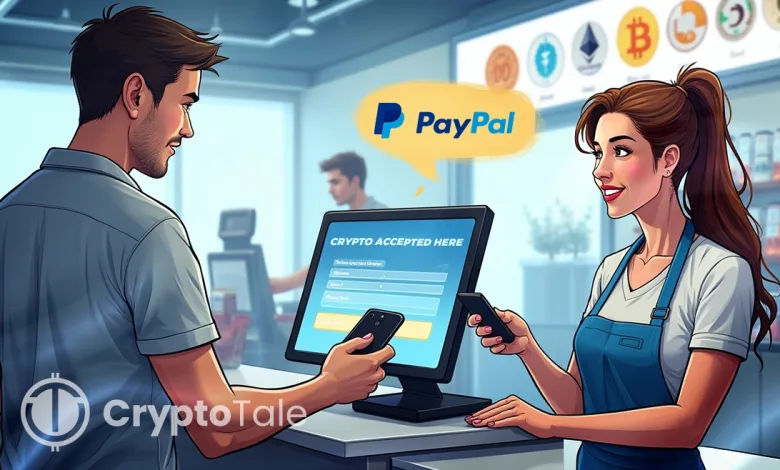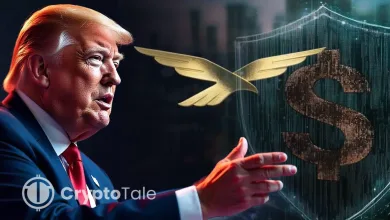PayPal Now Accepts 100+ Cryptos From Bitcoin to FARTCOIN

- PayPal unlocks crypto payments for U.S. merchants with over 100 supported tokens.
- Merchants enjoy low 0.99% fees and instant crypto-to-cash conversion via PYUSD.
- Global shoppers can now pay with crypto, boosting access for small businesses.
PayPal has announced the rollout of a new feature enabling all U.S. merchants to accept over 100 cryptocurrencies. The supported assets include major cryptocurrencies such as Bitcoin and Ethereum, and even memecoins like Fartcoin. This offering is now available to any business operating through PayPal’s online platform. The launch marks a significant move toward broader adoption of cryptocurrency payments in retail and e-commerce.
To promote early adoption, PayPal has introduced a promotional transaction fee of 0.99% for the first year. Following that, the rate will rise to 1.5%, which is even below the 1.57% average of credit card transaction fees in the U.S., as stated in the Nilson report. Such a reduced pricing model may encourage small and medium-sized businesses to make crypto payments more appealing. It also works to make businesses perform better in terms of profit margin, as well as attract a wider number of customers.
Streamlined Crypto Checkout and Global Connectivity
PayPal sends the transaction using centralized exchanges or decentralized systems like Uniswap, depending on the utilized wallet. The crypto would then be changed to the PayPal stablecoin PYUSD and then changed to U.S. dollars and transferred to the account of the merchant. The methodology allows the merchants to get rid of the cryptocurrency market risk without sacrificing the benefits of payments in cryptocurrencies on the blockchain.
The solution provided by PayPal ensures that conversions and settlements are made almost instantly, which decreases the delays created by the international banking system. CEO Alex Chriss stated,
Imagine a shopper in Guatemala buying a special gift from a merchant in Oklahoma City. Using PayPal’s open platform, the business can accept crypto for payments, increase their profit margins, pay lower transaction fees, and get near instant access to proceeds.
This infrastructure eliminates some of the common obstacles related to international investments, such as exchange rate fluctuations and rates that are charged on remittance fees. It also streamlines cross-border payments on behalf of the merchants and the customers.
Positioning as a Competitive Crypto Payment Rail
With this release, PayPal positions itself as a key competitor to crypto-native platforms offering decentralized payment services. The system includes complete integration—from wallet connectivity and exchange routing to stablecoin handling and fiat conversion. Few traditional fintech players currently offer an end-to-end experience for merchants at this scale. According to PayPal, over 650 million users globally hold crypto wallets, representing a $3 trillion market.
PYUSD, the stablecoin used in the process, is issued by Paxos, a regulated trust company, and has seen its market cap rise to $850 million in 2025. Holding PYUSD on PayPal also yields a 4% return, incentivizing merchants to keep balances within the ecosystem. By handling KYC, AML, fraud prevention, and chargebacks, PayPal reduces compliance burdens for merchants. This makes the offering more accessible to small businesses unfamiliar with crypto systems.
Related: PayPal World to Launch with Venmo, NPCI, Mercado Pago, and Tenpay
Market Conditions and Regulatory Environment Fuel Momentum
The new crypto initiative of PayPal was announced when the digital asset industry was recovering and the political mood had begun to shift. With the Trump administration, there is more regulatory support for digital assets.
Even though this new functionality of accepting crypto is not yet available to merchants outside the U.S, PayPal has indicated that they are planning to roll it out on a worldwide basis. It has not reported a timeline of international roll-out, yet cooperations, like the cooperation with Fiserv, indicate that the product can scale in the future. PayPal has also recently introduced “PayPal World,” which brings together 5 of today’s leading digital wallets onto a single platform to be integrated within a single platform to have even stronger cross-border payments.




